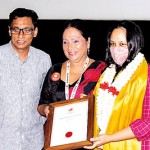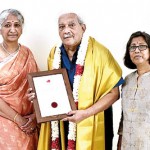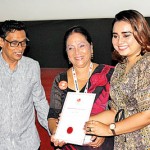Top stars emerged despite power cuts and fuel shortages
- India’s Prasun Chatterjee’s ‘Dostojee’ won the Best Debut Films in Competition
- Best National Short Film was won by Irushi Tennekoon’s ‘Thaji Dias on Traditional Dance’
- Filmmaker and producer Joe Dev Anandan and cinema writer Arthur U. Amarasena felicitated with Life Time Achievement awards
Surviving numerous odds and facing new challenges including many hours of power cuts and fuel shortages, the seventh successive Jaffna International Cinema Festival (JICF) completed introducing many new talents, felicitating yesteryear cinema greats and showcasing world renowned cinema works to the filmgoers in the peninsula. Organised by Agenda 14, Festival Director of JICF is Anomaa Rajakaruna.
Started last December and conducted with intermittent breaks due to Covid19 pandemic and other obstacles, this final edition of JICF was held from March 9 to 14 at the Kailasapathy Auditorium of the University of Jaffna and the award ceremony at Regal Cinema in Jaffna.
This year the Best Debut Film in Competition was won by India’s Prasun Chatterjee’s ‘Dostojee’ (Two Friends) and Special Jury Mention was given to Bangladeshi debut filmmaker Mohammad Rabby Miridha’s ‘No ground beneath my feet’. The other nomination was ‘The Last Bath’ (Portugal) by David Bonneville.
International Critics’ Jury comprising Lynda Belkhiria (France-Armenia), David W. Miller (UK), Meena Karnik (India), Antonio Urano(Brazil) and Susitha Fernando
(Sri Lanka) selecting ‘Dostojee’ as the Best Debut and noted in their citation “brilliantly carried by its young cast, the story was colourful, affecting and had enough of a political and religious subtext to give it real weight. A truly worthy winner.”
The Best National Short Film was won by Irushi Tennekoon’s ‘Thaji Dias on Traditional Dance’ while Special Jury Mention was awarded to Yasodhara Kariyawasam’s ‘The Kahata’. The Audience Award for Short Films was won by Nallaiah Savesan’s’The Bachelor Party’.
Ceylon Theatres Award for the Best National Short Film was won by ‘Thaji Dias on Traditional Dance’ directed by Irushi Tennekoon.
The Best International Short Film was awarded to ‘Sycorex’ (Portugal) by Lois Patino and Matias Pinerio while two other nominations- ‘Judy Free’ (The Philippines) by Che Tagyamon and ‘When I am Sad’ (Armenia and France) by Lilit Altunyan were special Jury Mentions. The jury for the Short Films in Competition (International and National) comprised of Per Fikse (Norway), Vimukthi Jayasundara (Sri Lanka) and Meenakshi Shedde (India).
Honouring the contribution of yesteryear film artistes, the JICF every year recognizes two veterans who have promoted cinema with outstanding contributions. Building a cultural and cinematic bridge between the North and the South, 7th JICF gave away Lifetime Achievement Awards to Jaffna born veteran filmmaker and producer Joe DevAnandan and veteran cinema writer and editor Arthur U. Amarasena.
Learning the art of filmmaking through experiment and creating many intriguing films, Joe Dev Anandan contributed to both Tamil and Sinhala film industries in
Sri Lanka. Born and bred in Chavakacheri, Anandan was able to watch many films, as his parents owned a cinema hall and this later motivate him to become a producer and a director.
In 1966 his film ‘Pasa Nila’ went to the history books as the first Tamil film produced in Jaffna and the first Jaffna film screened in London. At a time when South Indian Tamil films were dominating the theatres in Sri Lanka, he began making films in Sinhala. They included ‘Geetha’ (1970), ‘Sujeeva’ (1972), ‘Sunethra’ (1973), ‘Obai Mamai’, ‘Sookiri Kella’ (1975) and Minisun Athara Minihek (1979).
Returning Tamil filmmaking Anandan co-produced ‘Pilot Premnath’ (1980) with Indian superstar Sivaji Ganeson and Malini Fonseka and ‘Rathathin Rathame’ (1981) with Indian artistes. His next film had to be stopped halfway as 1983 communal riots broke out.
Veteran editor and writer Arthur U. Amarseana received the Lifetime Achievement award from the Jaffna University’s Vice Chancellor Prof. S. Srisatkunarajah and Head of the Department – Fine Arts Dr. Rathitharan Kathiresu.
Born in Wellabada, Panadura on March 3, 1938, Arthur UsmiyageAmarasena grew up in Katugasthota, Kandy. An ardent film lover from the early ages as a student of Katugasthota Sri Rahula MahaVidyalaya, he frequented the cinemas Wales, Wembley, and Odion in Kandy with his friends and watched most of the Sinhala, English, and Hindi films. He passionately collected articles about cinema published in Sinhala newspapers and Indian film magazines such as Filmfare and Screen.
- Yasodara Kariyawasam receiving special Jury Mention
- Joe Dev Ananda
- Irushi Tennakoon receiving the Best National Short Film from Prasanna Vithanage and veteran actress Sriyani Amerasena
- A scene from Best Debut Film awarded ‘Dostojee’
- Director of Dostojee Prasun Chatterjee
- Dinara Punchihewa mainactress of Gaadi addressing the audience at the final ceremony
- Arthur U. Amerasena
Amarasena was the editor of most number of cinema journals and periodicals in
Sri Lanka. He edited Chithravahini, Visithura, Surathura, Sithsara, and Piyakaru. A highlight of his work as an editor is that he challenged the widely established and conventional methods of editing.
Filmmaker PrasannaVithanage’s newest film ‘Gaadi’ was screened as the closing film of the festival.
Searching for that next furry family member but couldn’t find one in your area? Hitad.lk has the solution with our extensive listings of dogs for sale in Sri Lanka!









